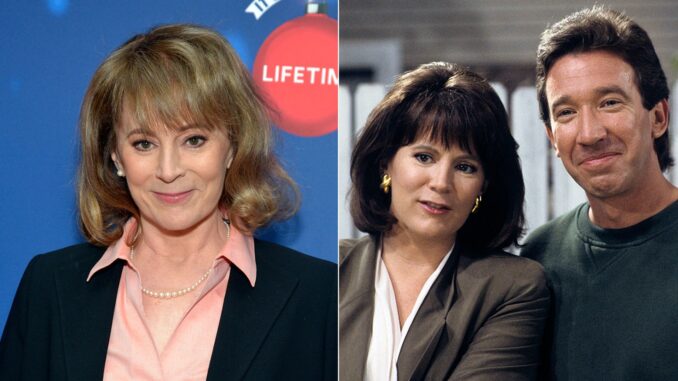
The Quiet Brilliance Beneath the Roar: Patricia Richardson on Tim Allen's Underrated Genius
The pop culture landscape of the 1990s was profoundly shaped by Home Improvement. For eight seasons, audiences tuned in weekly to witness the domestic chaos and workshop mishaps of Tim "The Tool Man" Taylor, masterfully brought to life by Tim Allen. His grunts, his catchphrases of "more power!" and the inevitable explosions became synonymous with a brand of boisterous, anachronistic masculinity that somehow resonated with mainstream America. Yet, amidst the nostalgic glow, a recent revelation from his long-time co-star, Patricia Richardson, has prompted a fascinating re-evaluation: Tim Allen, she suggests, was profoundly underrated on the show. This isn't just a sentimental reflection; it's an invitation to look beyond the obvious gags and recognize the subtle, foundational brilliance that underpinned one of television's most beloved sitcoms.
At first glance, "underrated" might seem a strange descriptor for a comedic star who anchored a top-rated show for nearly a decade. Tim Allen’s comedic persona was anything but subtle. He was a force of nature, a symphony of grunts and wide-eyed enthusiasm, perfectly embodying the well-meaning but often oblivious husband and father. He built a career on this larger-than-life character, a caricature of the American male obsessed with tools, power, and the misguided belief that more is always better. The "Tool Time" segments, with their escalating chaos and Allen's infectious glee, were the show's signature, guaranteeing laughs through physical comedy and predictable but hilarious mishaps. It was this overt, broad humor that endeared him to millions, establishing him as a household name. But perhaps, this very overtness also masked the deeper layers of his performance, leading audiences to appreciate the surface without fully grasping the underlying craft.
Patricia Richardson, who played the perpetually exasperated but deeply loving Jill Taylor, was perfectly positioned to observe this quiet brilliance. As Tim's on-screen wife and the show's indispensable straight woman, she was the anchor to his erratic genius, the rational foil to his impulsive antics. Her performance demanded a constant dance with Allen's energy, requiring her to react, to ground, and to subtly guide the narrative back from the brink of absurdity. It is from this vantage point, in the trenches of daily scene work, that she could truly appreciate what made Allen more than just a funny man.
What then, made Tim Allen underrated? It lies precisely in the often-overlooked nuances that elevated Tim "The Tool Man" Taylor beyond a mere caricature. Firstly, Allen possessed an incredible gift for grounded reaction. While he delivered many of the punchlines and initiated much of the physical comedy, his true genius often shone in his responses to the world around him. Observe his face as Jill delivers a biting, sarcastic retort, or when Al Borland, his earnest sidekick, offers a perfectly sensible piece of advice that Tim utterly fails to grasp. Allen's expressions – a slow blink, a confused furrow of the brow, a child-like pout – spoke volumes, building the comedic tension and allowing other characters to shine. He wasn't just delivering jokes; he was receiving them, and amplifying them through his genuine, often bewildered, reactions.
Secondly, Allen masterfully blended the absurd with genuine heart and vulnerability. For all his bluster and obsession with power tools, Tim Taylor was a devoted husband and father. He genuinely loved Jill, even when he exasperated her to no end. He dispensed advice, often misguided but well-intentioned, to his three sons. When a storyline called for a moment of seriousness, a parental lecture, or a confession of inadequacy, Allen could pivot seamlessly from the boisterous Tool Man to a genuinely touching family man. This ability to inject warmth and relatability into a character who could easily have been a one-note clown was crucial to the show's longevity. It allowed audiences to invest in the Taylor family beyond the laughs, to see them as a reflection of their own domestic lives.
Furthermore, Allen's performance was essential in providing the framework for the entire ensemble to thrive. Without his unique brand of chaotic energy, characters like Al's earnestness, Wilson's enigmatic wisdom, or Jill's sharp wit would not have had the dynamic contrast necessary to fully blossom. He was the sun around which these comedic planets orbited, his gravitational pull defining their movements and interactions. His willingness to be the butt of the joke, to be clumsy and foolish, paved the way for others to deliver their own comedic punches. This speaks to a generosity of spirit in his performance, understanding that the strength of a sitcom lies in its ensemble, not just its lead.
Patricia Richardson's revelation is more than just a fond memory; it’s a critical insight. It prompts us to reconsider what "underrated" truly means in the realm of popular entertainment. Often, it's not about a lack of success or fame, but about the deeper layers of craftsmanship that go unacknowledged, hidden beneath a character's defining traits. Tim Allen, with his iconic grunts and tool-centric antics, created a character so vividly memorable that the underlying skill—his impeccable timing, his reactive genius, his capacity for genuine emotion—was perhaps taken for granted. He wasn't just playing a funny character; he was expertly building one, screw by screw, grunt by grunt, into something far more robust and enduring than many gave him credit for. In the enduring legacy of Home Improvement, Tim Allen's work stands not just as a monument to '90s comedy, but as a testament to a quietly brilliant performance that continues to resonate, now with a new appreciation thanks to the discerning eye of his dearest co-star.